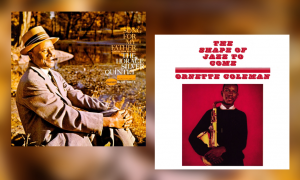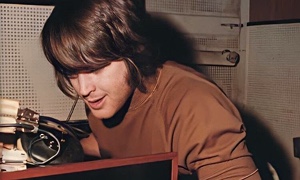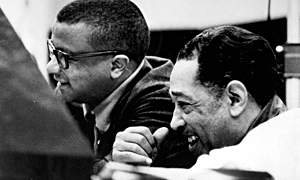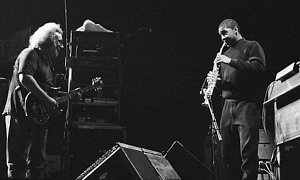Home » Jazz Articles » Building a Jazz Library » Riverside Records: An Alternative Top Ten
Riverside Records: An Alternative Top Ten

In the 1950s, there was a tremendous number of people who were fans, where if they said they were a producer, there was nobody to say, 'No, you're not.' If I'm one of the owners of a company and I decide I'm a jazz producer, who's going to tell me I'm wrong?
—Orrin Keepnews

Orrin Keepnews
producer1923 - 2015
In 2007, in his general introduction to the Keepnews Collection reissue series, Keepnews wrote: "For more than a half-century, I have frequently succeeded in finding, recognizing, coddling, arguing with, and collaborating with a great variety of talented and occasionally difficult people. On the whole, I am unreasonably and unshakably proud of the results." So he should have been.
Everyone has their own favourite Riverside albums, but the following would figure on most lists:

Thelonious Monk
piano1917 - 1982

Sonny Rollins
saxophoneb.1930

Cannonball Adderley
saxophone1928 - 1975

Nat Adderley
trumpet1931 - 2000

Wes Montgomery
guitar1923 - 1968

Bill Evans
piano1929 - 1980

Scott LaFaro
bass1936 - 1961

Paul Motian
drums1931 - 2011
This alternative top ten tries to avoid the most widely celebrated Riverside releases and to draw attention instead to some of the label's lesser known treasures.
RIVERSIDE RECORDS: STREAMS & TRIBUTARIES
 Randy Weston Trio
Randy Weston TrioJazz A La Bohemia
1957
Jazz A La Bohemia was recorded live at Greenwich Village's Caf®¶ Bohemia in 1956. It is the second Riverside album

Randy Weston
piano1926 - 2018

Cecil Payne
saxophone, baritone1922 - 2007

Harry Belafonte
vocals1927 - 2023
Jazz A La Bohemia also predates Weston's emergence as an artist who mainly recorded his own material. His only original on the album is the Monkish "Chessman's Delight." Keepnews preferred to record Weston on standards—his label debut was Cole Porter In A Modern Mood in 1954. This is forgivable, because Weston's interpretations of the Great American Songbook, like Monk's, are fresh, inventive and of immense charm. In 1959, however, Weston would release the all-original Little Niles (United Artists) and quirky covers became fewer and further between. Happily, Riverside had preserved some of them for posterity.
 Gigi Gryce
Gigi GryceGigi Gryce And The Jazz Lab Quintet
1957
If

Gigi Gryce
saxophone1927 - 1983

Charles Mingus
bass, acoustic1922 - 1979

Howard McGhee
trumpet1918 - 1987

Max Roach
drums1925 - 2007

Clifford Brown
trumpetb.1930
On Gigi Gryce And The Jazz Lab Quintet, Gryce shares the frontline and writing credits with

Donald Byrd
trumpet1932 - 2013
Gryce pushed the boundaries of bop and hard bop, and his work still engages in 2020. He was also a champion of musicians' rights, setting up his own publishing company, Melotone, in 1955, an unusual move for a jazz musician at that time. In the early 1960s, disenchanted with the music business, he moved into teaching.
 Herbie Mann
Herbie MannSultry Serenade
1957
Do not be fooled by the cheesy sleeve art. Sultry Serenade is indeed as sensual as its cover suggests, but it is more than a make-out album. Mann plays flute, alto flute and bass clarinet and leads an imaginatively assembled piano-less sextet which includes baritone saxophonist and second bass clarinetist

Jack Nimitz
saxophone, baritone1930 - 2009

Urbie Green
trombone1926 - 2018
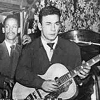
Joe Puma
guitarb.1927

Oscar Pettiford
bass1922 - 1960
Tyree Glenn
b.1912
Chico Hamilton
drums1921 - 2013
In 2020, Mann is best remembered for fusion albums across a range of genres—among them Flautista! Herbie Mann Plays Afro-Cuban Jazz (Verve, 1959), the unfortunately titled Gone Native (Savoy, 1961), and Do The Bossa Nova (Atlantic 1962)—and also for the soul-jazz infused Memphis Underground (Atlantic, 1969). At their best, Mann's albums combine innovation with accessibility. Sultry Serenade scores on both counts.
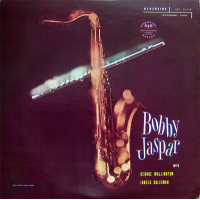 Bobby Jaspar
Bobby JasparTenor And Flute
1957
Like his British contemporary

Tubby Hayes
saxophone, tenor1935 - 1973
Bobby Jaspar
fluteb.1926

Chet Baker
trumpet and vocals1929 - 1988

Jimmy Raney
guitar, electric1927 - 1995

Blossom Dearie
piano and vocals1926 - 2009

Miles Davis
trumpet1926 - 1991

J.J. Johnson
trombone1924 - 2001
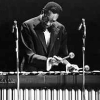
Milt Jackson
vibraphone1923 - 1999

Bill Evans
piano1929 - 1980
Tenor And Flute finds Jaspar in great company, leading a band which includes

George Wallington
piano1924 - 1993

Elvin Jones
drums1927 - 2004

Idrees Sulieman
trumpetb.1923

Lester Young
saxophone1909 - 1959
In their search for authentic jazz feeling, several prominent European musicians of the era, including Jaspar and Tubby Hayes, became involved with heroin, the drug of choice of so many of their American idols. Jaspar and Hayes both died of heroin-related causes while still in their thirties.
 Ahmed Abdul Malik
Ahmed Abdul MalikJazz Sahara
1958
Like

Yusef Lateef
woodwinds1920 - 2013

Ahmed Abdul-Malik
bass1927 - 1993
The album is subtitled Middle-Eastern Music With Johnny Griffin.

Johnny Griffin
saxophone, tenor1928 - 2008

John Coltrane
saxophone1926 - 1967

Wilbur Ware
bass, acoustic1923 - 1979
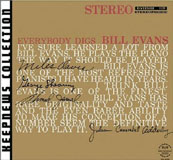 Bill Evans
Bill EvansEverybody Digs Bill Evans
1959
OK, this is a bit of a cheat, as the album is likely to be in the library of every serious Bill Evans enthusiast and so barely qualifies as an "alternative" selection. But Everybody Digs Bill Evans is too often overlooked in favour of the four Riverside albums Evans went on to record with Scott LaFaro and Paul Motian, of which the aforementioned Waltz For Debby is probably the most popular choice.
Like most Evans connoisseurs, Keepnews felt that the albums with LaFaro and Motian caught Evans at the peak of his artistry, the seraphic beauty of his playing ramped up by the intensity of interplay within the trio. Nonetheless, in his liner notes for the 2007 reissue of Everybody Digs Bill Evans, Keepnews wrote: "This might just possibly be my favorite Bill Evans album." The reason is the presence of

Philly Joe Jones
drums1923 - 1985
 Yusef Lateef
Yusef LateefThe Centaur And The Phoenix
1960
The Centaur And The Phoenix was recorded a full year before Yusef Lateef's better known Eastern Sounds (Moodsville, 1961). It is a grittier and more satisfying affair than the later disc, which was originally released on Prestige's easy listening imprint, Moodsville. Orrin Keepnews did not put pressure on Lateef to make his music more "acceptable" to American audiences (or if he did, he did not succeed), as Prestige's Bob Weinstock appears to have done.
The lineup on The Centaur And The Phoenix is larger and more adventurous than on Eastern Sounds. Lateef, who plays flute, oboe and tenor saxophone, leads a nonet which includes Tate Houston on baritone saxophone, Josea Taylor on bassoon,

Curtis Fuller
trombone1934 - 2021

Clark Terry
trumpet1920 - 2015

Joe Zawinul
keyboards1932 - 2007
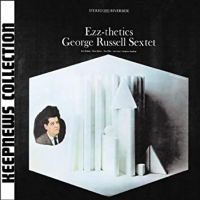 George Russell
George RussellEzz-thetics
1961
Pianist and composer

George Russell
composer / conductor1923 - 2009

Miles Davis
trumpet1926 - 1991
Ezz-thetics is one of several influential albums recorded by Russell in the late 1950s and early 1960s (another is Stratusphunk, released on Riverside in 1960). Here he leads a sextet which includes

Eric Dolphy
woodwinds1928 - 1964
 Mark Murphy
Mark MurphyRah
1961
Other than on its short-lived Living Legends series, which focused on veteran jazz and blues artists, Riverside did not release much vocal jazz. But when it did, Orrin Keepnews was right on the money. Opinions may be divided about

Chet Baker
trumpet and vocals1929 - 1988

Abbey Lincoln
vocals1930 - 2010

Mark Murphy
vocals1932 - 2015
Rah seems to have been made with some sort of socio-political concept in mind: Murphy has a book about economics on his knee and is holding a placard. But if there is such a concept, it is as enigmatic as the message on the placard. The message of the album is purely musical. The twelve-track set list is a treasure trove of jazz standards and Great American Songbook covers—"Green Dolphin Street," "Spring Can Really Hang You Up The Most," "Milestones," "Doodlin,'" "My Favorite Things," the evergreens go on. Outstanding, too, are

Ernie Wilkins
arranger1922 - 1999

Melba Liston
trombone1926 - 1999

Jimmy Cleveland
trombone1926 - 2008

Blue Mitchell
trumpet1930 - 1979

Jimmy Cobb
drums1929 - 2020
 Art Blakey
Art BlakeyUgetsu
1963
Among the last tranche of albums to be released by Riverside, Ugetsu has been unfairly overshadowed by

Art Blakey
drums1919 - 1990
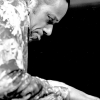 "
data-original-title="" title="">The Jazz Messengers which features a killer three-horn frontline comprising
"
data-original-title="" title="">The Jazz Messengers which features a killer three-horn frontline comprising 
Wayne Shorter
saxophone1933 - 2023

Freddie Hubbard
trumpet1938 - 2008
Photo: Orrin Keepnews with (seated l-r) Scott LaFaro, Bill Evans and Paul Motian at the Village Vanguard, 1961.
Tags
Comments
PREVIOUS / NEXT
Support All About Jazz
 All About Jazz has been a pillar of jazz since 1995, championing it as an art form and, more importantly, supporting the musicians who make it. Our enduring commitment has made "AAJ" one of the most culturally important websites of its kind, read by hundreds of thousands of fans, musicians and industry figures every month.
All About Jazz has been a pillar of jazz since 1995, championing it as an art form and, more importantly, supporting the musicians who make it. Our enduring commitment has made "AAJ" one of the most culturally important websites of its kind, read by hundreds of thousands of fans, musicians and industry figures every month.


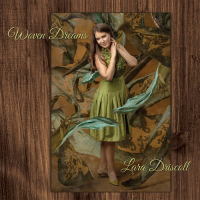


 Buy Now
Buy Now






